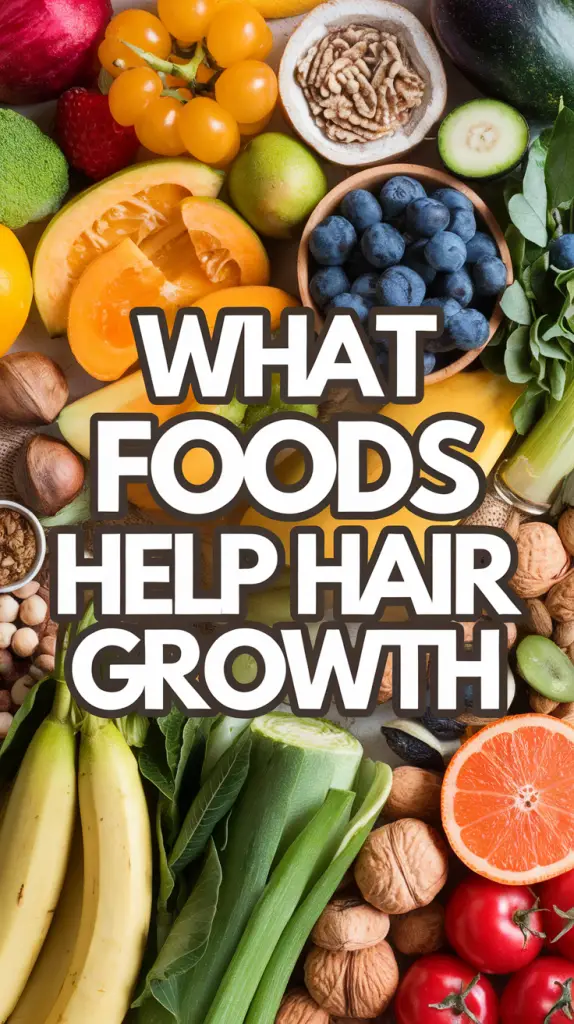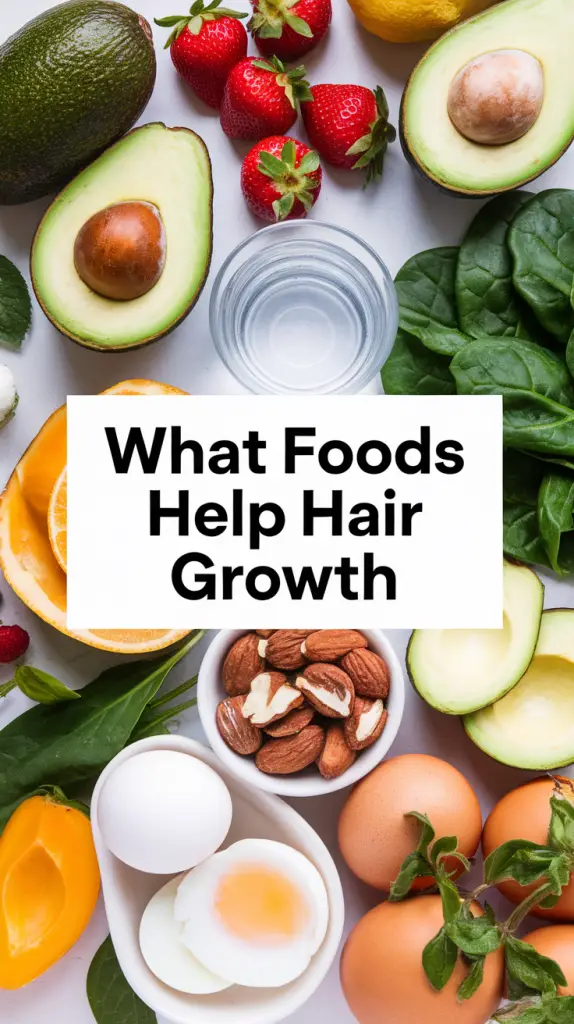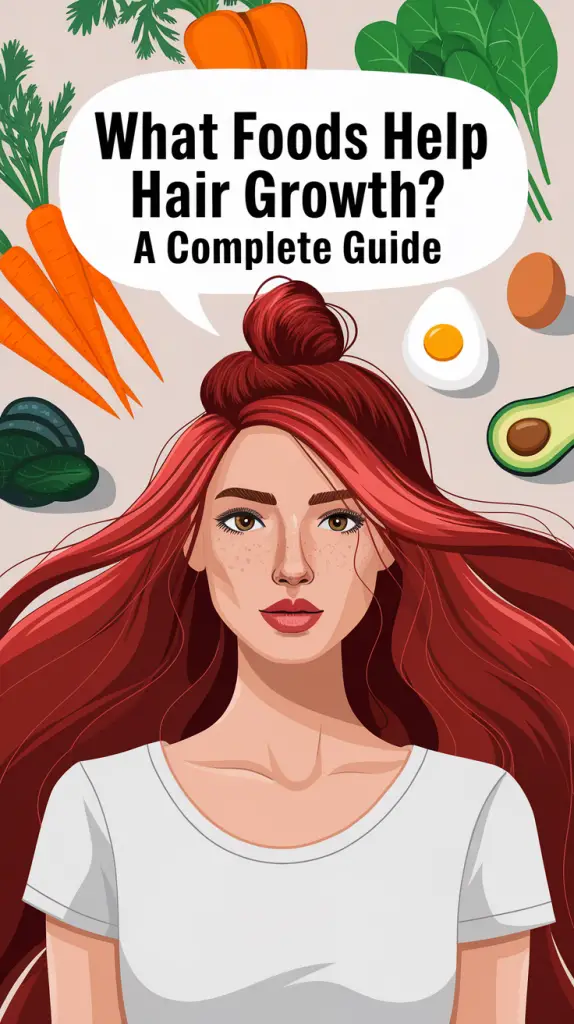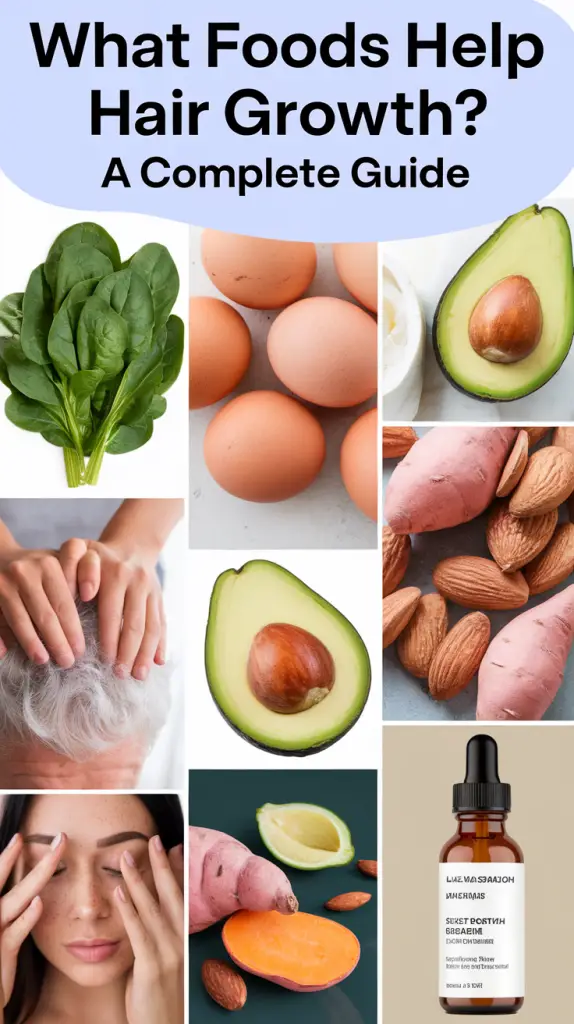What Foods Help Hair Growth? Complete Guide to Nutrition and Healthy Hair
Healthy, strong, and shiny hair is something most of us aspire to, and achieving it isn’t just about choosing the right products. In my experience, the secret often lies in the foods we eat daily. What you put on your plate has a direct impact on the health of your hair. In this guide, we’ll explore the best foods for hair growth, backed by practical tips and structured in a way that’s easy to follow.
Introduction to Hair Growth and Nutrition
Hair growth is influenced by many factors, including genetics, hormonal balance, and lifestyle habits. However, diet is one of the most significant contributors. Without the right nutrients, hair becomes prone to thinning, breakage, and slower growth. On the other hand, a nutrient-rich diet can fortify your strands, promote a healthy scalp, and stimulate growth.

Key Nutrients for Hair Growth
Your hair needs specific nutrients to thrive. Below is an overview of the most important ones:
1. Protein – Building Strong Strands
Hair is primarily made of keratin, a protein. Without sufficient protein, hair becomes weak and brittle.
| Protein Sources | Animal-Based Options | Plant-Based Options |
|---|---|---|
| High in protein | Eggs, chicken, fish | Tofu, lentils, quinoa |
| Easy to integrate daily | Dairy, lean meats | Nuts, seeds, chickpeas |
2. Omega-3 Fatty Acids – Nourishing Follicles
Omega-3s support a hydrated scalp and improve hair elasticity.
| Omega-3 Sources | Description |
|---|---|
| Fatty fish (salmon, mackerel) | Rich in DHA and EPA, essential fats |
| Flaxseeds, chia seeds | Vegan-friendly alternatives |
| Walnuts | Snackable source of omega-3 |
3. Essential Vitamins
Each vitamin plays a unique role in supporting hair health:
- Vitamin A: Keeps the scalp moisturized by supporting sebum production.
- Sources: Sweet potatoes, carrots, spinach.
- Vitamin C: Strengthens hair by promoting collagen production.
- Sources: Citrus fruits, strawberries, bell peppers.
- Vitamin E: Protects hair follicles from oxidative damage.
- Sources: Almonds, sunflower seeds, avocados.
4. Minerals for Hair Health
Minerals ensure your hair stays strong and resilient:
| Mineral | Key Function | Sources |
|---|---|---|
| Iron | Oxygen transport to hair follicles | Spinach, red meat, beans |
| Zinc | Tissue repair, scalp health | Pumpkin seeds, oysters |
| Selenium | Antioxidant that supports hair growth | Brazil nuts, sunflower seeds |
5. Biotin – A Crucial B Vitamin
Biotin boosts keratin production, which directly impacts hair strength and texture. Deficiency can lead to thinning or brittle hair.
- Sources: Eggs, almonds, whole grains.

The Role of Hydration
When I first began focusing on my hair’s health, I underestimated how much water intake matters. Staying hydrated ensures your hair follicles are nourished and prevents dryness. Include water-rich foods like cucumbers, zucchini, and watermelon in your meals.
Gut Health: The Hidden Hero of Hair Growth
A healthy gut absorbs nutrients effectively, ensuring your hair gets what it needs. Probiotic-rich foods such as yogurt, kefir, and fermented vegetables like kimchi or sauerkraut enhance nutrient absorption and boost overall health.
Sample Meal Plan for Hair Growth
Here’s a simple meal plan to incorporate hair-nourishing foods into your day:
| Meal | Example |
|---|---|
| Breakfast | Spinach omelette, whole-grain toast, and orange juice |
| Lunch | Grilled salmon with quinoa and a side of sautéed kale |
| Snack | A handful of walnuts and sunflower seeds |
| Dinner | Lentil soup with sweet potato and roasted bell peppers |
Practical Lifestyle Tips for Hair Growth
Diet is only one piece of the puzzle. Here are other habits I recommend for healthy hair:
- Stress Management: Practice yoga, meditation, or deep breathing to reduce stress, which can disrupt hair growth.
- Proper Sleep: Sleep restores hormone balance and promotes hair regeneration. Aim for 7-8 hours per night.
- Hair Care Routine: Use natural oils like coconut or castor oil for scalp massages to boost circulation.
Conclusion
Achieving strong, healthy hair starts from within. By adding protein, vitamins, and minerals to your diet, staying hydrated, and maintaining a healthy gut, you can significantly boost hair growth. Remember, consistency is key—changes won’t happen overnight, but with patience and the right foods, your hair will thank you.

FAQs About Foods That Help Hair Growth
1. Can eating certain foods really promote hair growth?
Yes! Nutrient-rich foods nourish hair follicles and support growth. Combining a healthy diet with good hair care practices can make a big difference.
2. How long before I see results?
It takes about 3-6 months of consistent dietary changes to notice significant improvements in hair growth.
3. Are supplements better than natural foods?
Supplements can help fill gaps in your diet, but natural foods provide a wider range of nutrients and additional benefits.
4. What foods should I avoid for better hair health?
Processed foods, excessive sugar, and trans fats can negatively impact hair by causing inflammation and nutrient imbalances.
5. Can hydration really impact hair growth?
Absolutely! Proper hydration supports scalp health and prevents dryness, which can lead to breakage.
6. Are there specific foods for faster hair growth?
While no food guarantees instant results, protein, biotin-rich foods, and omega-3s are known for their significant contributions to healthy hair growth.

